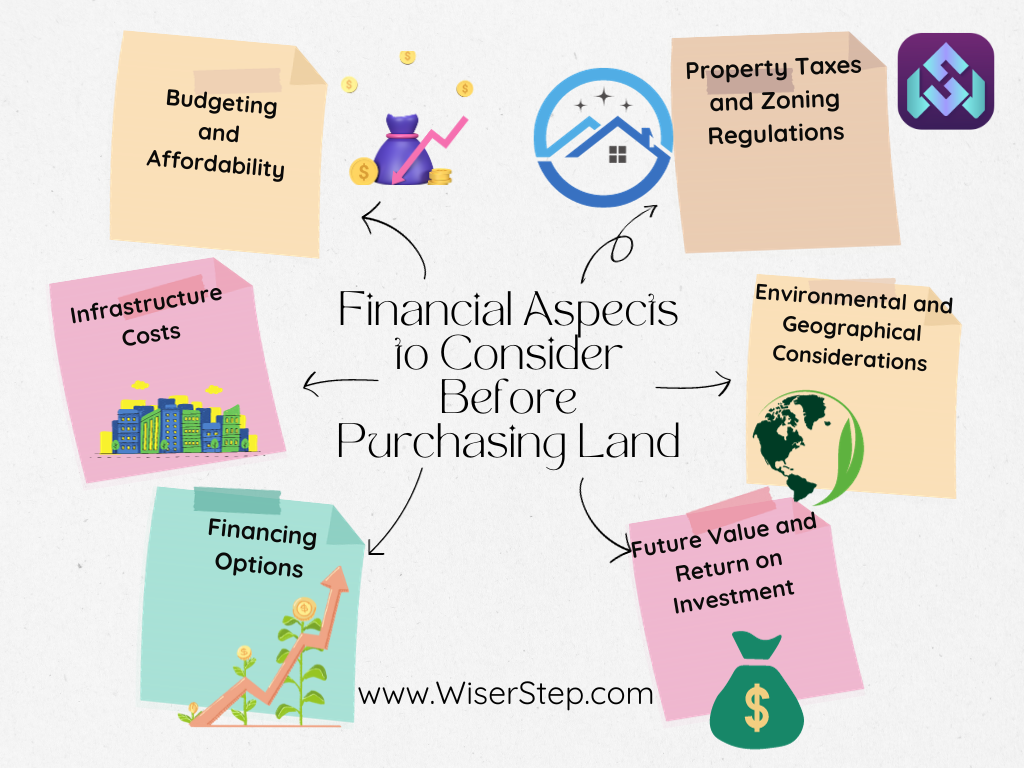Purchasing land is a significant financial decision that requires careful consideration. Whether you plan to build your dream home, start a business, or invest for future returns, it’s essential to weigh the financial aspects involved. While the prospect of owning land can be exciting, overlooking crucial financial factors can lead to unexpected expenses and regrets. In this blog, we will explore seven vital financial aspects you need to consider before purchasing land.
Budgeting and Affordability
Before diving into the land market, it’s crucial to establish a clear budget. Determine how much you can comfortably afford to spend on land without straining your finances. Consider your current financial situation, including your income, savings, and existing debts. Avoid overstretching your budget, as this could lead to financial stress in the long run. Factor in potential expenses such as property taxes, insurance, and maintenance costs.
Location
The location of the land plays a significant role in its price and potential for appreciation. Different areas have varying land values based on factors like proximity to urban centers, amenities, infrastructure development, and the local economy. While it may be tempting to purchase land in a remote area at a lower price, consider the long-term implications. Will the land’s value appreciate over time, or will it remain stagnant? Evaluate the location’s potential for growth and its impact on your investment.
Property Taxes and Zoning Regulations
Property taxes can vary widely based on the land’s location and size. Research the property tax rates in your desired area to understand the ongoing financial commitment. Additionally, familiarize yourself with local zoning regulations and land-use restrictions. These regulations can affect how you can use the land and may require additional expenses for permits or compliance with specific building codes.
Infrastructure Costs
Land may seem like a blank canvas, but developing it for your intended use can be expensive. Consider the cost of bringing utilities such as water, electricity, sewage, and gas to the property if they are not already available. Additionally, road access and connectivity can significantly impact the land’s usability and cost. Always factor in these infrastructure expenses when evaluating the overall financial picture.
Environmental and Geographical Considerations
Assess the environmental and geographical factors that could affect the land and its development costs. For instance, if the land is in a flood-prone area, you may need to invest in flood mitigation measures or secure comprehensive insurance. Likewise, properties in earthquake-prone zones may require additional construction expenses to meet safety standards. Conduct a thorough site assessment to identify any potential challenges that could impact your financial investment.
Financing Options
Consider how you will finance the land purchase. If you have the necessary funds saved, you may choose to buy the land outright. However, many buyers rely on financing options such as mortgages or land loans. Be sure to explore the available financing options, compare interest rates, and understand the terms and conditions. A well-structured financing plan can make land ownership more affordable and manageable.
Future Value and Return on Investment
While purchasing land can be a long-term investment, it’s essential to assess its potential for future value appreciation or income generation. If you’re buying land for investment purposes, research the local real estate market trends and economic forecasts. Consider factors like population growth, job opportunities, and planned infrastructure developments in the area. A well-chosen piece of land can offer attractive returns over time.
Purchasing land is a significant financial undertaking that requires careful consideration of various aspects. From budgeting and location selection to infrastructure costs and financing options, these financial factors play a crucial role in your land-buying decision. Ignoring any of these aspects could lead to financial challenges or missed opportunities.
Before making a land purchase, conduct thorough research, consult with experts, and create a comprehensive financial plan. By doing so, you can make a well-informed decision that aligns with your financial goals and ensures a successful land ownership experience. Remember that patience and due diligence are key when it comes to land investments, and a well-planned approach can lead to a rewarding and financially sound outcome.

